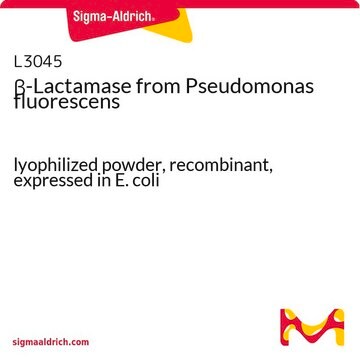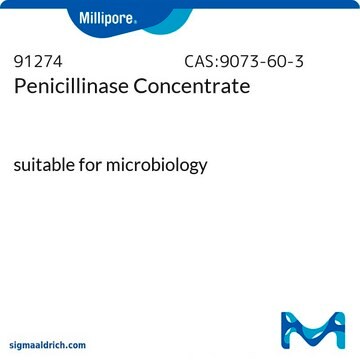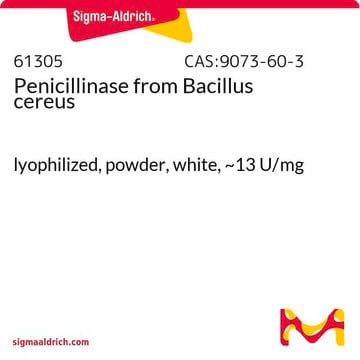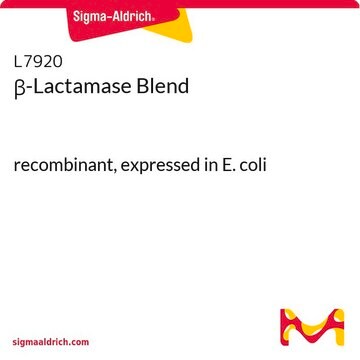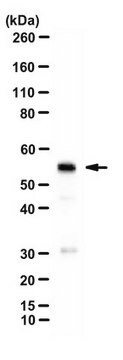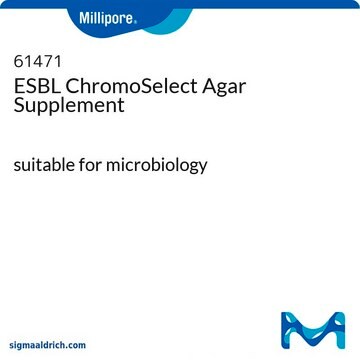L6170
β-Lactamase
recombinant, expressed in E. coli
Synonyme(s) :
Carbapenemase, Cephalosprinase
Se connecterpour consulter vos tarifs contractuels et ceux de votre entreprise/organisme
About This Item
Produits recommandés
Produit recombinant
expressed in E. coli
Niveau de qualité
Forme
powder
Activité spécifique
≥20 U/mg (with cephalosporin C)
≥400 U/mg (with benzylpenicilin)
Température de stockage
2-8°C
Description générale
β-Lactamase produced by bacteria is closely related to the penicillin binding proteins. β-Lactamase hydrolyzes β-lactum antibiotics and is the prime cause of resistance development by bacteria. There are four subclasses of β-Lactamases. Classes A, C and D form an acyl-enzyme via active site serine residue. Class B β-lactamases are metalloenzymes with zinc ion at their active site for β-lactam hydrolysis. Mutations in the β-lactamases has resulted in the generation of extended-spectrum β-lactamases (ESBLs). As close to 900 types of β-Lactamases are produced by microbes.
Application
β--lactamase is used to inactivate β-lactam antibiotics by breaking open the β-lactam ring. β--lactamase is used to study antibiotic resistance and resistance suppression. Product L6170 is recombinantly produced based on the sequence of the enzyme from Pseudomonas aeruginosa, and is expressed in E. coli.
β-Lactamase has been used in coumarin-cephalosporin-fluorescein-acetoxymethyl (CCF4)- β-Lactamase assay in dendritic cells and in the hydrolysis of meropenem (H-Mer) to generate 18O-labeled H-Mer.
Actions biochimiques/physiologiques
β--lactamase inactivates β-lactam antibiotics by breaking open the β-lactam ring. Typical analysis for other substrates: ceftriaxon 2-4 un/mg; cefazolin 2-4 un/mg; ceftazidime 1.5-3 un/mg; cefoxitin 0.35-0.7 un/mg; cefepime 1.2-2.4 un/mg; cefuroxime 1.5-3 un/mg; cefotaxime 1-2 un/mg, oxacillin 4-8 un/mg; imipenem 1.2-2.4 un/mg; and meropenem 3-6 un/mg
Typical analysis for other substrates: ceftriaxon 2-4 un/mg; cefazolin 2-4 un/mg; ceftazidime 1.5-3 un/mg; cefoxitin 0.35-0.7 un/mg; cefepime 1.2-2.4 un/mg; cefuroxime 1.5-3 un/mg; cefotaxime 1-2 un/mg, oxacillin 4-8 un/mg; imipenem 1.2-2.4 un/mg; and meropenem 3-6 un/mg
Définition de l'unité
One unit will hydrolyze 1.0 μmole substrate per min (βI: benzylpenicillin; βII: cephalosporin C) in 50 mM phosphate buffer, pH 7.0 containing 10 μM zinc chloride at 25 ºC.
Forme physique
Lyophilized powder containing sodium chloride and potassium phosphate.
Code de la classe de stockage
11 - Combustible Solids
Classe de danger pour l'eau (WGK)
WGK 3
Point d'éclair (°F)
Not applicable
Point d'éclair (°C)
Not applicable
Certificats d'analyse (COA)
Recherchez un Certificats d'analyse (COA) en saisissant le numéro de lot du produit. Les numéros de lot figurent sur l'étiquette du produit après les mots "Lot" ou "Batch".
Déjà en possession de ce produit ?
Retrouvez la documentation relative aux produits que vous avez récemment achetés dans la Bibliothèque de documents.
Les clients ont également consulté
Determining carbapenemase activity with 18O labeling and targeted mass spectrometry
Wang M, et al.
Analytical Chemistry, 85(22), 11014-11019 (2013)
Antibiotic resistance and extended spectrum beta-lactamases: Types, epidemiology and treatment
Shaikh S, et al.
Saudi Journal of Biological Sciences, 22(1), 90-101 (2015)
The Growing Genetic and Functional Diversity of Extended Spectrum Beta-Lactamases
Ali T, et al.
BioMed Research International, 2018 (2018)
Updated functional classification of beta-lactamases
Bush K and Jacoby GA
Antimicrobial Agents and Chemotherapy, 54(3), 969-976 (2010)
VAMP8-mediated NOX2 recruitment to endosomes is necessary for antigen release
Dingjan I, et al.
European Journal of Cell Biology, 96(7), 705-714 (2017)
Notre équipe de scientifiques dispose d'une expérience dans tous les secteurs de la recherche, notamment en sciences de la vie, science des matériaux, synthèse chimique, chromatographie, analyse et dans de nombreux autres domaines..
Contacter notre Service technique


